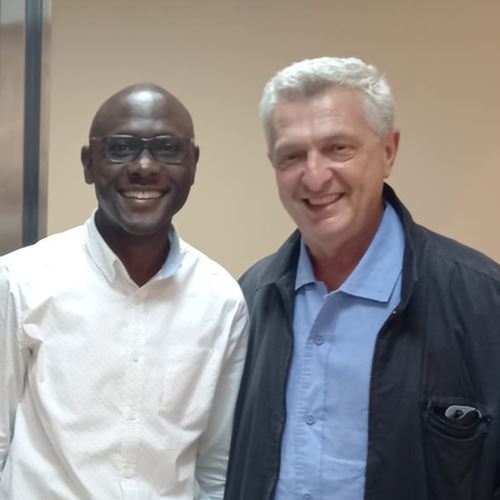Franklin Mubezi is a member of the DRC Humanitarian Response Roster and has been deployed to Ukraine as a Camp Coordination and Camp Management (CCCM) Officer since 25th May 2022. During his deployment with DRC-UNHCR, he was sent to Dnipro on a long mission to set up a CCCM Cluster Coordination mechanism for Eastern Ukraine and systems to support CCCM partners on site management activities in the IDP collective centers.
So far, his main responsibilities have involved sharing his technical expertise with the national CCCM cluster coordination team, working on national capacity building, developing and coordinating collective response strategies and action plans that adequately reflect global CCCM UNHCR standards, and contributing to promoting relevant CCCM training for local authorities.
Silvia: Can you describe to me your typical workday?
Franklin: I don’t really have a typical workday. When you work as a cluster coordinator, you need to play many roles. There is constant engagement with CCCM partners and OCHA counterparts through online or in-person meetings. We discuss on emerging needs; discuss action points and share technical guidance and advice. Every single day there is something new that may emerge because of the nature of the current situation on the ground. Sometimes I have only one meeting scheduled for the day, but I end up attending three or more. Since it is a completely new CCCM cluster, I have been working on setting up a coordination mechanism.
Because of its size and sensitivity, Dnipro is completely different to Lviv and other hubs: it requires far more energy and engagement under every aspect of CCCM. There are multiple requests for live updates from UN partners and Ukrainian regional and local authorities, so I have to collect this information and share it on a regular basis.
Silvia: What is like to live in a high-level hardship duty station?
Franklin: It is very tense now. The security situation evolves every single day, but so far it has not stopped us from continuing to respond to the needs of displaced people. We take all the necessary precautions, following the advice from the risk management personnel.
Silvia: How does this mission differ from your previous experiences?
Franklin: First, the scale of displacement in Ukraine cannot be compared to my previous deployments in Ethiopia and other countries. It’s a massive displacement: we are talking about over 6 million displaced people in the country. It calls for more engagement, more human resources, and more capacity building in order to conceive, from a CCCM point of view, an adequate emergency response framework.
Second, the CCCM cluster is completely new in this context, which means that you need to build up something from scratch. I need to train people to understand what CCCM is as opposed to other activities. What is CCCM as opposed to shelter? What is CCCM as opposed to non-food items distribution? That’s why I am here, to make sure that we build the partners’ capacity as much as possible so that they can operate within the global CCCM standards.
Finally, another unique aspect is that I don’t work within IDP camps, unlike in Ethiopia and other countries. Here, we have an urban displaced population that lives in collective sites, such as schools, kindergarten classrooms, dormitories or private buildings. Therefore, it is not about camp operation, but collective sites operation. My role has been to help translate our global standards and tools to fit this context.
Silvia: What has your relationship with the UNHCR staff been like? Do you feel well integrated?
Franklin: Starting from day one, I have been well integrated. Having already been deployed to a DRC-UNHCR mission and having extensive experience with the UNHCR as a national staff, both in and out of my own country, this has helped me to feel quickly at ease.
Silvia: What are your coping mechanisms for stress?
Franklin: We are in a four-week R&R cycle and I genuinely believe that taking a break after 4 or 5 working weeks is the best coping mechanism. Also talking regularly with my friends and family who are outside of Ukraine helps me reduce my level of stress.
Silvia: How is the operation taking care of your mental health?
Franklin: Your question comes at the right time! A staff counsellor arrived just yesterday at the office, and he is going to offer psychological support and counselling for employees. Therefore, I think the office is ahead of this situation in terms of staff welfare.
I'm also lucky that my focal point in DRC is the same as for my first deployment. She has been very supportive and approachable. She is regularly checking up on me.
